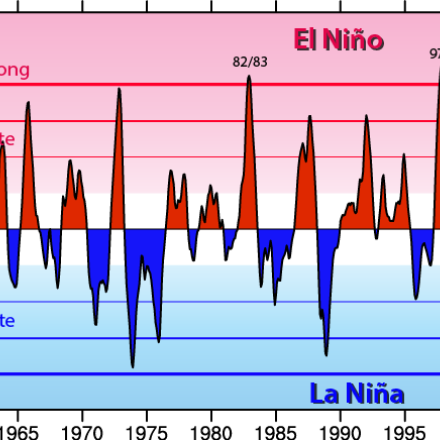Climate Indices
Climate indices are simple diagnostic quantities that are used to characterize an aspect of a geophysical system such as a circulation pattern. They track droughts, ENSO events, wind patterns, internal modes of climate variability, and extreme events like wildfires and heatwaves. Climate indices play a key role in climate monitoring and prediction. The climate index overview page summarizes the philosophy of climate indices.
To find a specific climate index, jump to the search box below or click your desired index from among the blue sub-category buttons.
To see only the indices with in-depth commentary, select the "Datasets with guidance" button when using the search box.
Dataset Overviews
Climate datasets
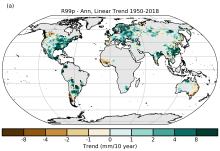 HadEX3: Gridded Temperature and Precipitation Climate Extremes Indices (CLIMDEX data)
HadEX3: Gridded Temperature and Precipitation Climate Extremes Indices (CLIMDEX data)
Years of Record
- 1901-01 to 2018-12
HadEX3 provides gridded, station-based indices of temperature- and precipitation- related climate extremes and supersedes HadEX2. It is intended for global and continental…
Main variables and Earth System components
Atmosphere Air Temperature at 2m Maximum Air Temperature Minimum Air Temperature Land Freeze/ThawExperts contributing reviews
- Dunn, Robert
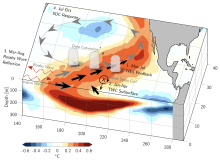 Meridional Modes and their indices
Meridional Modes and their indices
Years of Record
In each of the world’s tropical ocean basins, year-to-year climate variability is primarily governed by fluctuations in the zonal sea surface temperature (SST) gradient and…
-
Formats
- N/A
-
Timestep
- N/A
-
Domain
- Atlantic Ocean, Pacific Ocean
-
Collections
- N/A
Experts contributing reviews
- Amaya, Dillon
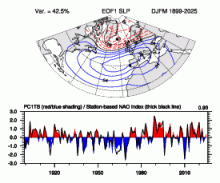 Hurrell North Atlantic Oscillation (NAO) Index (PC-based)
Hurrell North Atlantic Oscillation (NAO) Index (PC-based)
Years of Record
- 1899-01 to 2025-03
The principal component (PC)-based indices of the North Atlantic Oscillation (NAO) are the time series of the leading Empirical Orthogonal Function (EOF) of SLP anomalies…
-
Formats
- ascii
-
Timestep
- Monthly, Seasonal, Annual
-
Domain
- Atlantic Ocean
-
Collections
- Climate Analysis Section (CAS) Data Catalog
Experts contributing reviews
- Hurrell, James | Phillips, Adam
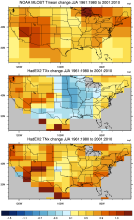 HadEX2: Gridded Temperature and Precipitation Climate Extremes Indices (CLIMDEX data)
HadEX2: Gridded Temperature and Precipitation Climate Extremes Indices (CLIMDEX data)
Years of Record
- 1901-01 to 2010-12
Note: HadEX2 has been superseded by HadEX3. HadEX2 provides gridded, station-based indices of temperature- and precipitation- related climate extremes. It is intended for…
Main variables and Earth System components
Atmosphere Maximum Air Temperature Minimum Air Temperature Land Freeze/ThawExperts contributing reviews
- N/A
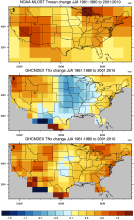 GHCNDEX: Gridded Temperature and Precipitation Climate Extremes Indices (CLIMDEX data)
GHCNDEX: Gridded Temperature and Precipitation Climate Extremes Indices (CLIMDEX data)
Years of Record
- 1951-01 to 2014-02
GHCNDEX provides gridded, station-based indices of temperature- and precipitation- related climate extremes. It is intended for detection and attribution studies, climate…
Main variables and Earth System components
Atmosphere Maximum Air Temperature Minimum Air Temperature Land Freeze/ThawExperts contributing reviews
- N/A
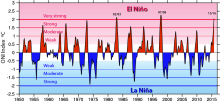 Overview: Climate Indices
Overview: Climate Indices
Years of Record
A climate index is a simple diagnostic quantity that is used to characterize an aspect of a geophysical system such as a circulation pattern. A variety of methods have been…
-
Formats
- N/A
-
Timestep
- N/A
-
Domain
- N/A
-
Collections
- Overview / Comparison page
Experts contributing reviews
- N/A
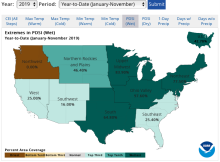 U.S. Climate Extremes Index (CEI)
U.S. Climate Extremes Index (CEI)
Years of Record
- 1910-01 to 2019-11
The U.S. Climate Extremes Index (CEI) was first presented in 1995 as a framework for quantifying observed changes in climate within the contiguous United States. At…
Main variables and Earth System components
Atmosphere Air Temperature Maximum Air Temperature Minimum Air Temperature Precipitation Wind Land Drought-
Formats
- ascii
-
Timestep
- Monthly, Seasonal, Annual
-
Domain
- North America
-
Collections
- N/A
Experts contributing reviews
- Gleason, Karin
 Atlantic Multi-decadal Oscillation (AMO) and Atlantic Multidecadal Variability (AMV)
Atlantic Multi-decadal Oscillation (AMO) and Atlantic Multidecadal Variability (AMV)
Years of Record
- 1870-01 to 2021-03
The Atlantic Multi-decadal Oscillation (AMO) has been identified as a coherent mode of natural variability occurring in the North Atlantic Ocean with an estimated period of…
-
Timestep
- Monthly, Decadal
-
Collections
- Climate Analysis Section (CAS) Data Catalog
Experts contributing reviews
- Trenberth, Kevin | Zhang, Rong
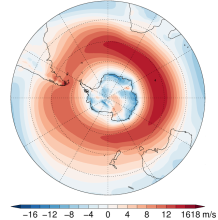 Southern Hemisphere westerly jet strength and position
Southern Hemisphere westerly jet strength and position
Years of Record
- 1979-12 to 2016-12
The dynamics of the Southern Hemisphere westerly jet are described in terms of two indices, jet strength and jet latitude. Here, these indices are defined using the…
-
Formats
- ascii
-
Timestep
- Seasonal, Annual
-
Collections
- N/A
Experts contributing reviews
- Bracegirdle, Thomas J.
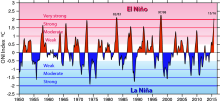 Nino SST Indices (Nino 1+2, 3, 3.4, 4; ONI and TNI)
Nino SST Indices (Nino 1+2, 3, 3.4, 4; ONI and TNI)
Years of Record
- 1870-01 to 2023-04
There are several indices used to monitor the tropical Pacific, all of which are based on sea surface temperature (SST) anomalies averaged across a given region. …
-
Formats
- ascii
-
Timestep
- Monthly
-
Domain
- Pacific Ocean, Tropics
-
Collections
- Climate Analysis Section (CAS) Data Catalog
Experts contributing reviews
- Trenberth, Kevin
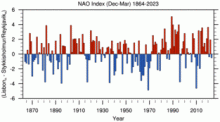 Hurrell North Atlantic Oscillation (NAO) Index (station-based)
Hurrell North Atlantic Oscillation (NAO) Index (station-based)
Years of Record
- 1865-01 to 2023-06
The winter (December thru March) station-based index of the NAO is based on the difference of normalized sea level pressure (SLP) between Lisbon, Portugal and…
-
Formats
- ascii
-
Timestep
- Monthly, Seasonal, Annual
-
Domain
- Atlantic Ocean
-
Collections
- Climate Analysis Section (CAS) Data Catalog
Experts contributing reviews
- Hurrell, James | Phillips, Adam
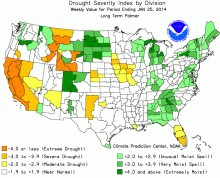 Palmer Drought Severity Index (PDSI)
Palmer Drought Severity Index (PDSI)
Years of Record
The Palmer Drought Severity Index (PDSI) uses readily available temperature and precipitation data to estimate relative dryness. It is a standardized index that generally…
-
Timestep
- Monthly
-
Domain
- Global
-
Collections
- Climate Analysis Section (CAS) Data Catalog
Experts contributing reviews
- Dai, Aiguo | Bui, Sang | Lenssen, Nathan
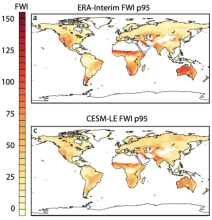 Canadian Forest Fire Weather Index (FWI)
Canadian Forest Fire Weather Index (FWI)
Years of Record
Fire weather indices are used to quantify the meteorological conditions that can lead to fire ignition and spread. They are used to communicate fire danger levels to…
Main variables and Earth System components
Atmosphere-
Formats
- N/A
-
Timestep
- N/A
-
Domain
- N/A
-
Collections
- N/A
Experts contributing reviews
- Touma, Danielle
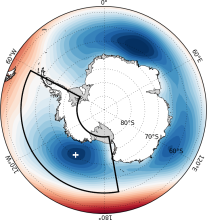 Amundsen Sea Low indices
Amundsen Sea Low indices
Years of Record
- 1959-01 to 2022-12
The Amundsen Sea Low (ASL) is a climatological low pressure center located over the extreme southern Pacific Ocean, off the coast of West Antarctica. Atmospheric…
-
Timestep
- Monthly, Seasonal, Annual
-
Collections
- N/A
Experts contributing reviews
- Hosking, Scott
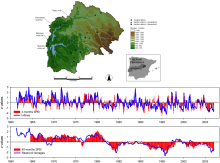 Standardized Precipitation Evapotranspiration Index (SPEI)
Standardized Precipitation Evapotranspiration Index (SPEI)
Years of Record
- 1901-01 to 2014-03
The Standardized Precipitation Evapotranspiration Index (SPEI) is an extension of the widely used Standardized Precipitation Index (SPI). The SPEI is designed to take into…
Main variables and Earth System components
N/AExperts contributing reviews
- Vicente-Serrano, Sergio M.
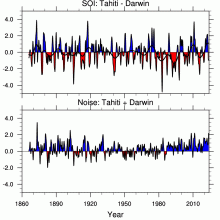 Southern Oscillation Indices: Signal, Noise and Tahiti/Darwin SLP (SOI)
Southern Oscillation Indices: Signal, Noise and Tahiti/Darwin SLP (SOI)
Years of Record
- 1866-01 to 2025-03
The Southern Oscillation Index (SOI) is a time series used to characterize the large scale sea level pressure (SLP) patterns in the tropical Pacific. Monthly mean SLP at…
-
Timestep
- Monthly
-
Domain
- Australia, Pacific Ocean, Tropics
-
Collections
- Climate Analysis Section (CAS) Data Catalog
Experts contributing reviews
- Trenberth, Kevin
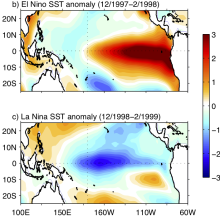 Asymmetry and Diversity in the pattern, amplitude and duration of El Niño and La Niña
Asymmetry and Diversity in the pattern, amplitude and duration of El Niño and La Niña
Years of Record
El Niño and La Niña, the two phases of ENSO, are sometimes described as opposites. However, there are asymmetries in their spatial structure, amplitude, duration and…
-
Formats
- N/A
-
Timestep
- N/A
-
Domain
- Tropics
-
Collections
- N/A
Experts contributing reviews
- Santoso, Agus
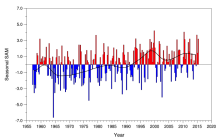 Marshall Southern Annular Mode (SAM) Index (Station-based)
Marshall Southern Annular Mode (SAM) Index (Station-based)
Years of Record
- 1957-01 to 2015-09
The station-based index of the Southern Annular Mode (SAM) is based on the zonal pressure difference between the latitudes of 40S and 65S. As such, the SAM index…
-
Formats
- ascii
-
Timestep
- N/A
-
Collections
- N/A
Experts contributing reviews
- Marshall, Gareth
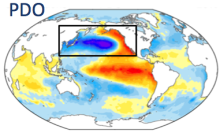 Pacific Decadal Oscillation (PDO): Definition and Indices
Pacific Decadal Oscillation (PDO): Definition and Indices
Years of Record
- 1900-01 to 2015-12
The Pacific Decadal Oscillation (PDO) is defined by the leading pattern (EOF) of sea surface temperature (SST) anomalies in the North Pacific basin (typically, polewards of…
-
Formats
- ascii
-
Timestep
- Monthly
-
Domain
- Pacific Ocean
-
Collections
- N/A
Experts contributing reviews
- Deser, Clara | Trenberth, Kevin
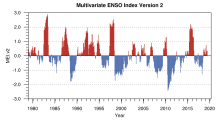 Multivariate ENSO Index
Multivariate ENSO Index
Years of Record
- 1979-01 to 2019-05
The Multivariate ENSO Index (MEI) is said to capture a more holistic representation of the atmospheric and oceanic anomalies that occur during ENSO events than do single-…
Main variables and Earth System components
N/A-
Formats
- ascii
-
Timestep
- Monthly
-
Domain
- Pacific Ocean
-
Collections
- Climate Analysis Section (CAS) Data Catalog
Experts contributing reviews
- N/A
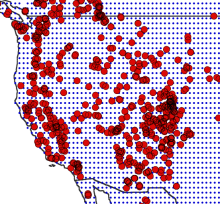 Drought atlases from tree rings
Drought atlases from tree rings
Years of Record
- 0000-01 to 2005-12
Tree-ring drought atlases provide a paleoclimate analog to modern drought indices, most commonly the Palmer Drought Severity Index (PDSI). Produced on a regular lat-…
-
Timestep
- Annual
-
Domain
- North America
-
Collections
- N/A
Experts contributing reviews
- Cook, Edward
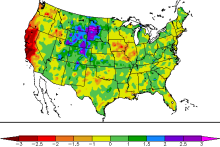 Standardized Precipitation Index (SPI)
Standardized Precipitation Index (SPI)
Years of Record
- 1949-01 to 2018-07
The Standardized Precipitation Index (SPI) is a widely used index to characterize meteorological drought on a range of timescales. On short timescales, the SPI is closely…
-
Formats
- N/A
-
Timestep
- Monthly
-
Domain
- N/A
-
Collections
- N/A
Experts contributing reviews
- Keyantash, John
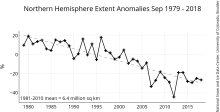 NSIDC Sea Ice Index
NSIDC Sea Ice Index
Years of Record
- 1978-10 to 2022-01
The NSIDC Sea Ice Index is a suite of easy-to-use sea ice analyses to track changes in Arctic and Antarctic sea ice. The product is produced and supported by the NOAA at…
Experts contributing reviews
- Meier, Walter
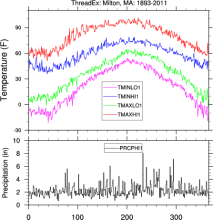 NOAA ThreadEx Long-term Station Extremes for America
NOAA ThreadEx Long-term Station Extremes for America
Years of Record
- 1870-01 to 2011-12
ThreadEx is a data set of extreme daily temperature and precipitation values for 270 locations in the United States. For each day of the year at each station, ThreadEx…
Main variables and Earth System components
Atmosphere Air Temperature Maximum Air Temperature Minimum Air Temperature Precipitation-
Formats
- ascii
-
Timestep
- Daily
-
Domain
- North America
-
Collections
- N/A
Experts contributing reviews
- N/A
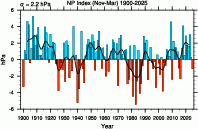 North Pacific (NP) Index by Trenberth and Hurrell; monthly and winter
North Pacific (NP) Index by Trenberth and Hurrell; monthly and winter
Years of Record
- 1899-01 to 2025-08
The North Pacific Index (NP index or NPI) is the area-weighted sea level pressure over the region 30°N-65°N, 160°E-140°W. The NP index is defined to measure interannual to…
-
Formats
- ascii
-
Timestep
- Monthly, Seasonal
-
Collections
- Climate Analysis Section (CAS) Data Catalog
Experts contributing reviews
- Hurrell, James | Phillips, Adam
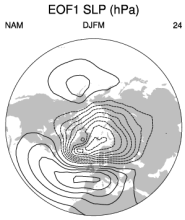 Hurrell wintertime SLP-based Northern Annular Mode (NAM) Index
Hurrell wintertime SLP-based Northern Annular Mode (NAM) Index
Years of Record
- 1899-01 to 2025-03
The NAM (or Arctic Oscillation) is defined as the first EOF of NH (20°-90°N) winter SLP data. It explains 23% of the extended winter mean (December-March) variance, and it…
-
Formats
- ascii
-
Timestep
- Seasonal
-
Collections
- N/A
Experts contributing reviews
- Phillips, Adam
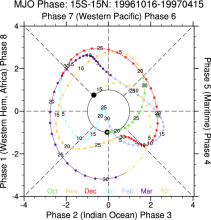 MJO: Madden-Julian Oscillation Diagnostics
MJO: Madden-Julian Oscillation Diagnostics
Years of Record
"The Madden–Julian oscillation (MJO) is the largest element of the intraseasonal (30–90 days) variability in the tropical atmosphere. It is a large-scale coupling between…
Main variables and Earth System components
N/A-
Formats
- N/A
-
Timestep
- N/A
-
Domain
- N/A
-
Collections
- N/A
Experts contributing reviews
- N/A
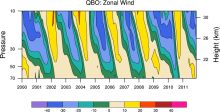 QBO: Quasi-Biennial Oscillation
QBO: Quasi-Biennial Oscillation
Years of Record
- 1953-01 to 2012-09
The quasi-biennial oscillation (QBO) is a quasi-periodic oscillation of the equatorial zonal wind between easterlies and westerlies in the tropical stratosphere with a mean…
Experts contributing reviews
- N/A
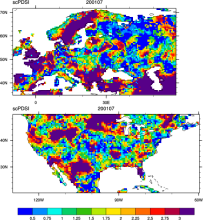 CRU sc-PDSI (self-calibrating PDSI) over Europe & North America
CRU sc-PDSI (self-calibrating PDSI) over Europe & North America
Years of Record
- 1901-01 to 2002-12
Maps of the monthly self-calibrating Palmer drought severity index (SCPDSI) have been calculated for the period 1901–2002 for the contiguous United States (20°–50°N and 130…
-
Formats
- ascii
-
Timestep
- Monthly
-
Domain
- Europe, North America
-
Collections
- N/A
Experts contributing reviews
- N/A
